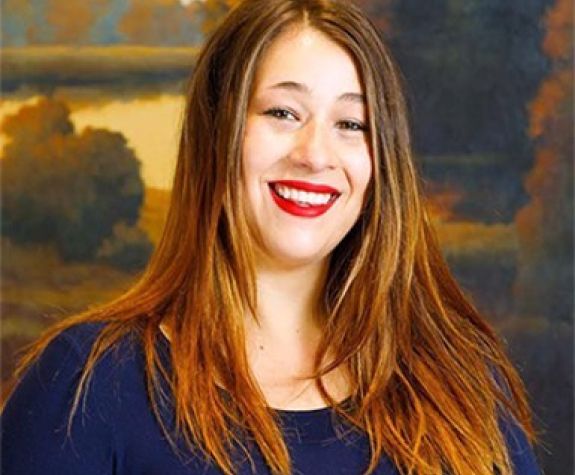
Major: Spanish and International Studies
Graduation Year: 2011
Company: Cohen Law Office
Q - Tell us about your major.
A - I did a combination of majors within the Spanish department and the School of International Studies as well as anthropology. I knew at a very young age that I wanted to learn more about the world and globalization, language and how it works. I felt like the School of International Studies would provide that.
Q - Did you study abroad?
A - I studied in Viña del Mar, Chile. I was at a university there for two semesters. I spent about a year down there and actually ended up going back after I graduated for a little bit as well.
Q - What did you study? Did you have any internships?
A - I worked with this nonprofit (in South America) that would go around and seek out homeless people on the streets and give them food. I would help prepare and transport food to the homeless shelters. During Christmas break, which is their summer break, I spent some time doing an internship in Peru at a clinic with kids suffering from serious medical conditions. Those were just some of the things that I did outside of studying and taking classes, but a lot of my coursework was about Spanish-American culture and civilization along with Spanish linguistics. I was taking a lot of art classes, but I was also taking a lot of culture, linguistics, and trying to develop my Spanish language skills.
Q - Did you learn more Spanish there than you would have learned here on campus?
A - Exactly! I had been studying abroad and going abroad since the time I was 14, jumping on opportunities that would help me travel abroad. I went to Mexico City when I was 14 and participated in Model UN. I also worked in Ecuador for a little bit, and that's what drove me to seek out the international studies program. I knew that it was going to lead me to other opportunities. For example, the school paid for me and six other people in Pacific to go to Panama for two weeks to learn about permaculture, and that was all funded by the School of International Studies. That was during my senior year, and I would've never gotten that opportunity if it wasn't for Spanish or the International Studies program.
Q - How did your experiences at Pacific and abroad help in the job you have right now?
A - So, the reason that I am in the legal field right now is due to my Spanish skills. After I graduated from University of the Pacific, I went back down to Chile. I worked for a newspaper that was in English, actually. It was catering to the ex-patriots that live in the country. Then I finally fell into doing medical interpretation for a little bit. That's when I figured out that interpreting was something I wanted to get into. Around 2014, I was offered the first official court interpreter job for Teton County (Wyoming) courts. My title is Spanish interpreter and immigration paralegal.
Q - Is immigration a growing area of law?
A - Yes, it is a very needed area of the law. There's not enough immigration lawyers, or translators or interpreters to go around. There are so many people who want to be documented in the correct way, but our immigration system is so messed up that there are all these hoops you have to jump through. The immigrant community ... they are constantly living in fear right now. The kids at schools, their anxiety levels are high because they don't know (when) they come home from school if their dad or mom is going to be there. In the last two years, we have seen over 30 deportations, and it's affected our community greatly. Being able to calm that fear for people and say, "It's over. Your nightmare is over. You're safe," is good. It is life changing for them.
Q - Do you ever get to see any successes? For example, a point where somebody gets their visa?
A - Yes, I saw quite a few successes. We helped someone become naturalized, which means they ... become ... a U.S. citizen. We've also been able to stop two deportation cases by arguing against the government. The other case was violence against women's acts. When immigrant women are victims of crime in the U.S., that can lead to an avenue of citizenship for them because of the immigration laws that have been created. It's cool when you can calm people down from the fear (they've experienced). Successes can be few and far between working in immigration law. You really have to remember why you're doing this work because you see a lot of sad things, but when you can say to someone, "Here is your citizenship, you don't ever have to worry about being torn from your family," that's a cool thing.
Q - I imagine you're the one who gets to know the families best because you get to talk to them.
A - Yes, through these cases you are not only their legal adviser but their therapist and translator. I get to know every facet of their lives. People are coming to us in crisis. Their guards are down, and they are very vulnerable, and you have to play a caretaker role to reassure it will be OK. Clients sometimes can become family. I think not only immigration lawyers or paralegals can say that. A lot of other lawyers can say that, but this works specifically because you're working for a marginalized community. You get really close, especially when you speak the same language that they do, it makes them feel almost at home.
Q - What would you say to students who are thinking about majoring in a foreign language?
A - I would say you shouldn't think about it, you should 100 percent do it because it'll change your life. There's a saying that speaking another language is possessing another soul. If you speak another language you open yourself up to being able to speak with almost half the world, if not a large portion of the world. If you can take advantage of it, I would jump on it.



